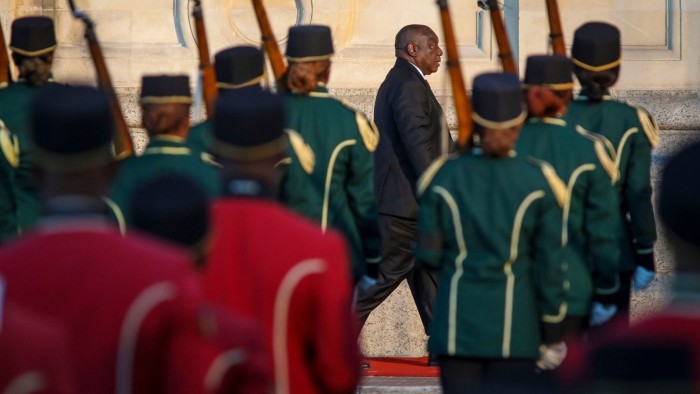Unlock the White House Watch newsletter for free
Your guide to what the 2024 US election means for Washington and the world
Cyril Ramaphosa, South Africa’s president, spoke for 90 minutes during his state of the nation address last week, but the only words that anyone remembered the next day were: “We will not be bullied.”
Though the name of Donald Trump went unmentioned, everyone knew who Ramaphosa was talking about.
A few days earlier, the US president had written on his Truth Social platform that South Africa was “confiscating land and treating certain classes of people VERY BADLY”. (Trump’s emphasis.) He later told reporters that South Africa’s leadership was “doing some terrible things, some horrible things” before issuing an executive order freezing aid to the country.
Trump’s barrage was followed by a post on X from Elon Musk, whose hopes of bringing his Starlink satellite internet service to his native South Africa are being delayed by admittedly clumsy Black empowerment legislation. Musk wrote to Ramaphosa: “Why do you have openly racist ownership laws?”
South Africa has been blindsided. There is much to criticise it for. The African National Congress policies have been failing for years. The ANC has lost so much support that it has been forced to go into coalition with the market-friendly Democratic Alliance, a party that ought to be much more to Washington’s liking.
Despite its claim to the moral high ground, South Africa has a patchy foreign policy. Shortly after the Hamas October 7 attacks on Israel, Naledi Pandor, then South African foreign minister, held a phone conversation with Hamas and flew to Iran. Pretoria has been sickeningly ambiguous over Russia’s invasion of Ukraine, and Ramaphosa has gone out of his way to be friendly to Vladimir Putin.
Odd then that Trump and Musk should have chosen to focus on race, in the form of criticising the new land expropriation law. True, many white South Africans don’t much like positive discrimination rules, which have been used to enrich a narrow Black elite. Nor do they like the sound of land confiscation, though few think it will happen on a large scale given the strength of the country’s courts.
Trump’s attack may actually unite South Africans. Only a deliberately perverse reading of the country’s history could possibly conclude that white people have been hard done by. They make up 8 per cent of the population but own 75 per cent of the land. You only need to go to a fancy restaurant in Cape Town to see where the money is. This continued domination of the economy is a direct result of an apartheid system that deliberately suppressed Black people’s prospects.
Even the Afrikaners to whom Trump offered asylum — some of whom do so well it would be like giving refugee status to residents of the Hamptons — mostly said thanks, but no thanks. Certainly, some farmers have been killed, though that is because South Africa is a violent country, not because Afrikaners are targeted. The Solidarity Movement, which says it represents 600,000 Afrikaner families, said: “We may disagree with the ANC, but we love our country . . . Repatriation of Afrikaners as refugees is not a solution.”
Though Trump talks a lot about land confiscation, Pretoria is convinced its real offence is to have taken Israel to the International Court of Justice. Trump’s executive order blamed it for accusing “Israel, not Hamas of genocide”. As a sign of his displeasure, he would cut $453mn of aid, he said, a decision that will mainly affect people with HIV and tuberculosis.
South Africa fears the broadside will be followed by other punishments. Marco Rubio, US secretary of state, will not be attending this month’s G20 summit hosted by South Africa. It was using the G20 to promote “solidarity, equality, & sustainability”, he said, terrible words in the Trump lexicon that are apparently code for “DEI and climate change”. Pretoria also fears it could lose market access privileges under the US African Growth and Opportunity Act, which would damage its car and farming industry.
What can Pretoria do? It will find it hard to appease Trump even if it wants to. The ICJ case has already been filed. South Africa is now less, not more, likely to give Musk’s Starlink a quick route to invest in the country. Nor will it drop the land expropriation bill that, it insists, is similar to legislation in most western countries.
But South Africa will do everything it can to de-escalate. It will seek to persuade Trump that he has got it wrong, even though he is not exactly a stickler for the facts. It will try to keep the peace and pray that the storm blows over. And it will hope that Trump finds some other country to pick on.
Read the full article here




